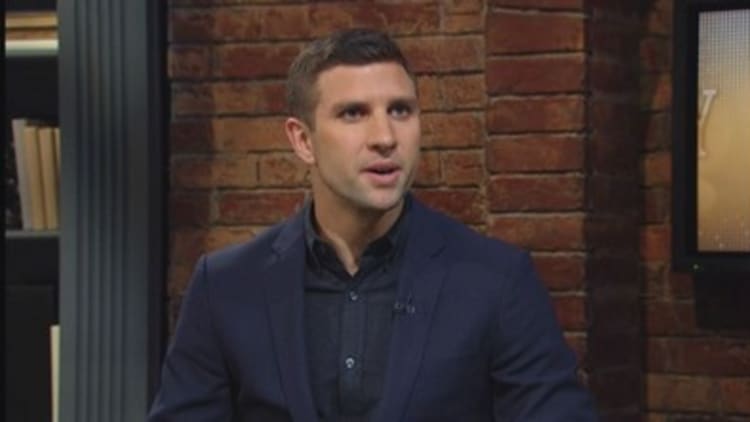
The number of fast-casual restaurants has skyrocketed since 2009—it's the only niche in the restaurant sector that's shown any growth—and that has led to some big public offerings, from Chipotle to Shake Shack. But critics contend that today's fast-casual boom still lacks one key ingredient: health.
Franklin Becker, fine-dining veteran and celebrity chef, is aiming to change that. Becker has added fast-casual chain entrepreneur to his résumé and has teamed up with a New York City fast-food power broker Aurify Brands (Five Guys, Dunkin' Donuts and Melt Shop). Together, they plan to make The Little Beet the next fast-casual boom recipe, focused not just on better ingredients but overall better human health.
"America is in the beginning phases of a revolution," said Becker. "No longer are we looking for mass-produced foods. We are looking towards a healthier lifestyle. In our schools, in our workplaces and at home, everyone is more aware of what they eat."
A recent New York Times analysis of Chipotle's menu revealed sodium levels that would make undergrads surviving on ramen noodles and Kraft mac seem to be leading as healthy a lifestyle as barbacoa burrito salad fans. The average meal at Chipotle has more than 1,000 calories, "a full day's worth of salt and 75 percent of a full day's worth of saturated fat," the Times reported. Burgers and fries and caramel shakes speak for their own nutritional content. What both Chipotle and Shack Shake show is that using good ingredients isn't necessarily a recipe for a healthy lifestyle as much as partially healthy indulgence.
Read MoreGolf legend Greg Normans' big swing for business success
Now in his mid-forties, Becker has been a regular on "Beat Bobby Flay", was a contestant on BRAVO's "Top Chef Masters," and The Food Network's "Iron Chef America," and has appeared on various popular morning shows like "TODAY" and "CBS This Morning." As corporate chef for EMM—a premier restaurant management company that hosts events attended by celebs from Jay-Z to John Travolta—Becker developed award-winning menu items for upscale eateries like Abe & Arthur's, CATCH and Lexington Brass. He was executive chef for fine-dining haunts like Capitale, Brasserie and Trinity at the Tribeca Grand. He received accolades from the notoriously stringent New York food critic Gael Greene, honorable mentions from John Mariani (formerly of Esquire) and others.
Backed by Aurify Brands, Becker's new venture, The Little Beet, is a complete departure from the restaurant investment group's traditional calorie-dense portfolio staples. Though The Little Beet falls into the fast-casual category, it attempts to differentiate itself from other fast-casual restaurants by offering consumers "Guiltin' Free" products with their largely gluten-free menu items.
"It's the first concept that we've developed that is actually healthy," said Aurify CEO John Rigos. "Five Guys we franchised. Melt Shop [in Manhattan] is artisanal, with great-quality, great-tasting ingredients. But at The Little Beet, we actually use the vegetables. You can actually taste the broccoli, cauliflower, string beans. Most times you can't, because they're smothered in sauce."
A plan to "beet" the competition
The Little Beet uses locally sourced ingredients whenever possible. Where a simple chicken burrito sans sauce, cheese, guacamole and sour cream comes in at 790 calories, and a single ShackBurger without cheese or fries weighs in at 490 calories, a Little Beet chicken plate with a side of sweet potatoes is only 470 calories.
Read More10 of America'sfastest growing restaurants
In fewer than 18 months, The Little Beet has expanded from one flagship store in Manhattan to include another location in the affluent suburb of Garden City, Long Island. As executive chef, Becker has also helped develop The Little Beet brand into a full-service dine-in restaurant called The Little Beet Table. The Little Beet currently serves about 1,500 people daily and plans to open seven new locations in the near future, with one opening on West 51st and Park Avenue by summer 2015, then expand into Washington, D.C.
Becker is moving more aggressively to expand than some of the blockbuster fast-casual chains. Chipotle waited two years to open its second and third location, and it was three years before Chipotle opened a fourth location, according to its corporate website.
The Little Beet's business plan is riding the coattails of the fast-casual juggernaut, which partially explains why Becker is moving swiftly to expand. NPD Group Restaurant analyst Bonnie Riggs said the restaurant industry was hit hard by the recession in 2009, and the fast-casual sector is the only niche to have had strong growth year after year. It reached $23.3 billion, as of February, up 10 percent over the year-ago period. Visits to fast casual restaurants increased by 7 percent compared to a year ago, according to The NPD Group/CREST research unit.
"People like the idea of fresh, quality taste and know it's not necessarily the cheapest, but they see it as a value," she said. "Cosi closed a few units recently," the analyst said. "Baja Grill had some challenges. For some stores, traffic is down. But fast casual is giving consumers what they want for right now," Riggs added.
America is in the beginning phases of a revolution. No longer are we looking for mass-produced foods. We are looking towards a healthier lifestyle.Franklin Beckercelebrity chef
Success for Becker did not always come easily, so he's also making up for time well spent learning how to run a restaurant as a business, as well as learning to build a business informed by personal health crises.
In 1997, years before winning awards at Capitale and earning BRAVO's Top Chef title, Becker was a personal chef for American billionaire businessman Ron Perelman and worked as an apprentice to Bobby Flay. At 27, his career was just taking off. Then suddenly he was diagnosed with Type 2 diabetes. He immediately committed himself to developing healthier cooking methods. He opted for simple, clean ingredients—and lost 35 pounds.
He penned "The Diabetic Chef" in 2005 and "Eat & Beat Diabetes with Picture Perfect Weight Loss" in 2010. Paula Deen he isn't.
Still, it wasn't until 1999, when he and his then-wife Jennifer had their son, Sean, that Becker pledged to make his healthful food businesses work. Sean was born with autism and celiac disease.
"I wish someone would have told me how hard and how long I would have to work to become successful," Becker said. "I needed to learn the business. ... The turning point was the sheer expense of having a child on the [autistic] spectrum—wanting to make sure that he is and will be well taken care of."
Read More8 business owners making millions, and a difference, in elder care
A few years ago, Becker and Rigos were introduced through mutual contacts in the industry. Aurify was already looking to create a healthy fast-casual brand and trusted that Becker's fine dining sensibilities, his skill set and his ethos would pair well with the company's vision.
"Becker oversees the culinary part of the business," Rigos said. "He makes sure the taste and the sources and presentation is up to his standards. We make sure the business works, and The Little Beet is doing exceptionally well. We're seeing a ton of repeat business."
Lessons learned
1. Do not get ahead of yourself. Make time to develop a plan and see it through effectively.
"There are steps that need to be followed," Becker said. "You need to work with people you can trust. I have people who do quality checks at least three times a day." While this ensures that The Little Beet's food quality is the same as it was the day before, Becker also says the checks keep his team from resting on their laurels.
2. Know your numbers.
"[Before opening The Little Beet], I was fortunate enough to have earned positions that helped me understand a bit about the financial side," Becker said. "I also had a decent business acumen. But I didn't know the importance of returns and—depending on your concept—the need for diversity and lower prices and dense enough traffic to support 50 percent returns. I didn't know about 20 percent in-store profitability or that the labor and heat costs should max out at 50 percent to 55 percent in the worst-case scenario. Investors care about that stuff."
3. Stay true to yourself, but understand the importance of branding.
"We needed a name that would roll off the tongue. You need an attractive package," Becker said. Becker's regular stints on television and other media are also a huge help for his business. "I love it. It's helped tremendously. It's good exposure."




